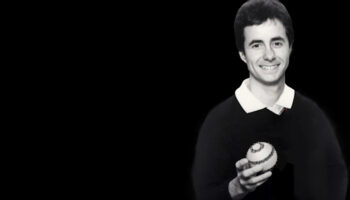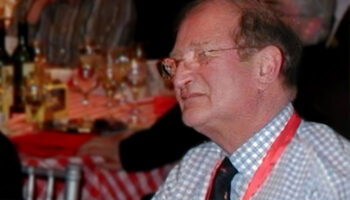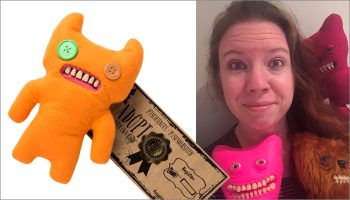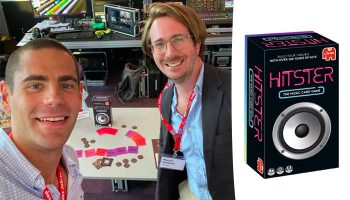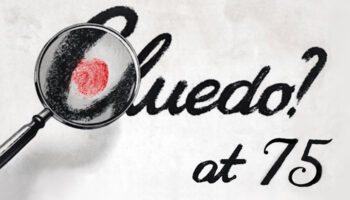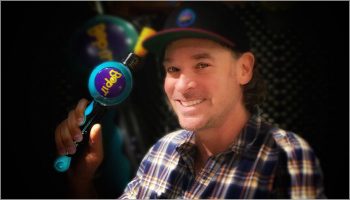“Without him, it would never have happened.” Ron Dubren on I.D.I.O.T. winner Stan Clutton

Ron – a pleasure to welcome you back! Billy Langsworthy spoke with you last year about your co-inventing Tickle Me Elmo. People can read that here. We’re tying in today, though, because I wanted to talk about the I.D.I.O.T. Award winner, Stan Clutton. Unfortunately, Stan passed over in 2011. What needs to be said about Stan?
I only knew Stan professionally, but I would say right away that the best thing to say about him is that he was an inventor’s champion. When I started out, Stan was a head guy that I presented to when I had toy ideas. But he became much more a person to me because he was, in Yiddish terms, a mensch – which means a true man.
True as in ‘integrity’… He acted with honour?
Yes, he always acted with honour, and in the inventor’s interest. He always made sure we got treated fairly. And that’s really important in this industry. So yes, he was a mensch.
Great word: every conversation should have a little Yiddish thrown in. What other quality made Stan stand out? What made him worthy of an I.D.I.O.T. Award?
That’s an interesting question. Simply put, I think he was excellent at his job. Whenever I encountered him, he was doing the best he could. He always tried to make it work. And it’s interesting because when you have a hit toy and then – if you’re lucky – a toy craze, you understand the expression ‘success has many parents, but failure is an orphan’…
Ha! I’ve not heard that before! And you’re referring here to Tickle Me Elmo because – if I understand correctly – Stan was very important to the development of that?
Right. More than important – it couldn’t have happened without him. I mean, a lot of people were important, but when you have a pop-culture phenomenon, which Tickle Me became, a lot of people step up to say that they were the one that did this or that or the other. And you know what? They did! Everybody’s right. So success does have many parents, and many of those people are unsung heroes. But, you know, Stan doesn’t get enough credit for Tickle Me Elmo…

No?
Not enough, I think, no. That’s the thing that bothers me. Of all the people involved, all I can say is that Stan was the person that maybe deserved the most credit… Because, as I say, without him it would never have happened. And this is where it makes me sad, Deej, because it’s like I didn’t give him enough credit.
You yourself didn’t?
I didn’t. I mean, I may have thanked him, I may have said, “It’s great”, but I didn’t do it in the way that he really deserved – and I don’t think anybody else did. So I feel this is a chance for me to repair that; to say “I dropped the ball on that” – because I didn’t ever really say to him, “Stan – wow… I really have to thank you for how fantastic you were just making this happen.” And the saddest part about Stan is not only that he didn’t really get the thanks and credit for what he did, but also that he died so young. That’s like a double whammy.
You sound emotional, Ron…
This is why I kind of choked up a little when I talked about it with Billy, and when I talk about it with you now because, really, I’m talking about my guilt, I think. I’m talking about the fact that I dropped the ball. So now – well, anything I can do to help give him credit, I’ll do it. This is my way of thanking him.
That’s very moving, Ron. Clearly, this is important to you, and I don’t know what consolation it is to know that it’s also clear to me how grateful you are to Stan. So tell me: how did you get into the industry? And what was Stan’s role in Tickle Me Elmo?
Well, this goes back a way… So back in the early ’80s, I met a man by the name of Larry Mass. We met in a Young Man’s Hebrew Association, which is the equivalent of the YMCA here in New York. I was playing racketball or something, and I went into the locker room and overheard the words Toy Fair. I wasn’t in the toy business at that time, but I’d been playing Scrabble a lot and came to realise that somebody must’ve invented it. And the light bulb went off in terms of ‘I should invent a game’.
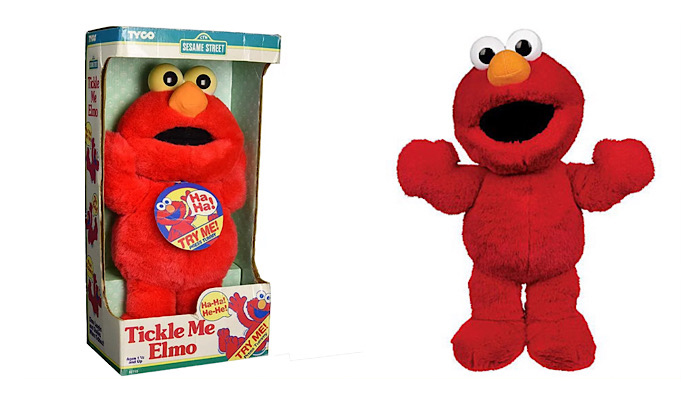
So you were somewhat primed to learn more about the toy industry?
Right. Because I had started working on games – but that locker-room conversation was the moment when preparation met opportunity. So I overhear these two words, “Toy Fair” – but I have no idea what that meant. But I just went over to Larry and asked what it was. He explained that it was the place where all the major toy companies show their new products. And he asked me, “Why? Are you an inventor?” And I said, “Yes, I’m an inventor.”
Ha! “I am now!”
Yes! I said I’d been working on some stuff, and he told me I should come and show him. And Larry happened to be the guy that worked for Stan Clutton at Gabriel Toys – no longer in existence. Gabriel was a toy company in New York that put its name on the map by marketing Othello. Long story short: I presented some of my stuff to Larry: he zeroed in on a game which I discussed with Billy – Chinese Chess. Not my name, but an interesting conflation of checkers and chess. Anyway, Larry took it in to Stan. Stan obviously liked it; it was the first product I ever licensed in the toy business.
How did it do?
Oh, it tanked completely. Ha!
Ha! But Stan was in the mix from your very first idea…
Right. I think I might’ve first met Stan when I came to negotiate the deal. I might’ve negotiated it through Larry… It was so long ago. After that first product, though, I got to know Stan. Over the next 15 years, I’d present to Stan at whatever company he’d then gone to. Each time he wound up at a new company, he’d ask if I had anything that was right for them. I don’t think there was a single thing he ever actually wanted. Ha!
Except Elmo…
Well, this is where the story gets kind of fun. I had an idea for a toy. The basic concept was a plush character, but with a standout feature… That you tickle it and it laughs more and more, gets into an infectious laughing jag, something Stan always referred to as “losing it.” I sought out another inventor—Greg Hyman—a software engineering genius with the tech chops to make a prototype. He became my partner on the project…
Greg also suggested the character be a chimp or monkey, so we have the birth of Tickles the Chimp. I’m the one that winds up making the presentation to Stan. And you know, just about the first thing out of Stan’s mouth was, “This is really good. It would make such a great Elmo.”

He immediately saw it as Elmo?
Exactly right. Unfortunately, Playtime didn’t have the rights to Elmo plush. They only had the rights to plastic Sesame Street products. But Stan passed me on to Gene Murtha. Gene handled the Looney Tunes license, literally across the hall from Stan. And when I showed Tickles the Chimp to Gene, the first thing out of his mouth was “Tickle me…”. So Gene coined that name and had the idea that it could make a great Tasmanian Devil for Looney Tunes. And for a time, that’s where the idea of Tickle Me was headed.
Now, fast forward six months… I got a call from Stan. His boss, Marty Scheman, saw a way that Playtime could possibly get all the Sesame Street rights – plush and plastic. He had this idea to lure them by offering to TV advertise a feature Sesame Street character plush. Well, that was music to their ears. And thank goodness Stan was there, because Stan remembered the Tickle Me idea.
Oh, I see! Tickle Me Taz was still in development, but Stan remembered it and championed it as the first Sesame Street feature plush?
Yes, he remembered that presentation, and his idea of it being perfect for Elmo. And the rest is history! As I say, I want to give credit where credit is due. Because if Stan hadn’t had that thought, hadn’t said it in that presentation – and hadn’t come back to it months later – Tickle Me Elmo never would’ve happened. More than that, though: Stan continued to look after us long after Elmo had become a success – and maybe his ethics are another reason he got the I.D.I.O.T. Award…
Go on…
As toy inventors, we have to give up creative control of our ideas. At some point, we have to say, “Okay, you’re free to change things.” Well, there are a lot of people at toy and game companies who might take advantage of that. They figure if an idea changes enough, it’s no longer the original concept, you know?

I do. “We changed it one bit at a time – so it’s not yours anymore!”
Right – but Stan would never allow anything like that to happen. He would protect inventors. I don’t know if you know about TMX Elmo, for example, but that came out around 10 years after Tickle Me Elmo. It was an enormous hit. It was a brilliant toy. So amazing! I still can’t believe what it does. It takes the tickling fit and physicalises it in a way you can’t imagine. It’s fantastic. But the question came up: if this is so different from Tickle me Elmo, should the original inventors still be compensated for it?
And the answer there might be a different one depending on whether you’re asking a lawyer or a mensch…
Right! Legally, I’m not sure we had any protection. It’s a still a Tickle Me Elmo product, though, and that’s our baby. So ethically we had protection – and Stan stood for ethics. The fair thing was to do a shared royalty. And that’s what we did, with Stan making sure the share was fair. He wouldn’t have it any other way. And he continued to protect us when other related products happened. Stan understood the importance of the relationships you develop over time; that there’s a certain amount of trust that builds up. I knew he’d always treat us fairly, champion us and advocate for us when we weren’t there. That’s what ethics are… Stan knew it’s not just about what’s written and what’s legal. He was a mensch!
Brilliant. Let’s wrap it up there, Ron – I know you’re working on a movie script about this stuff, too, and it sounds fascinating. I hope you’ll come back and talk to us about that as it comes together.

A Note from Stan’s Daughter, Jacqueline Jenkin
“Although my dad passed away too soon, my mom and I were lucky to witness first-hand his passion, joy, and enthusiasm for the toy industry. He approached his career as he did every part of his life – with unwavering integrity.
Always humble, receiving the I.D.I.O.T. was a moment of immense pride for dad… A meaningful recognition of his dedication and hard work in the career he truly loved.”
–
To stay in the loop with the latest news, interviews and features from the world of toy and game design, sign up to our weekly newsletter here




